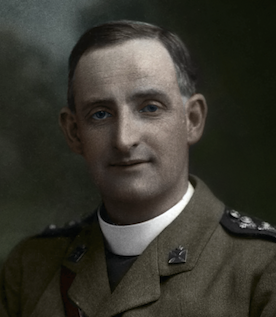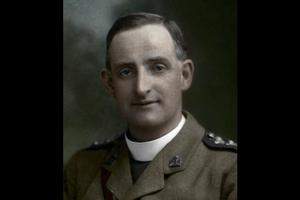Father Willie Doyle: World War I’s Forgotten ‘Martyr of Charity’
Looking back at the legacy of a military chaplain.

It was the eleventh hour of the 11th day of the 11th month in 1918 when the armistice ended World War I and became what we now celebrate as Veterans Day.
“The war showed us the strength of great nations acting together for high purposes,” Woodrow Wilson wrote to Americans on that day.
The salvation of souls was one of those “high purposes” for Irish Jesuit Father Willie Doyle, who served as the chaplain of the 16th Irish Division of the British army during World War I.

His tenacity in spiritually and physically shepherding the soldiers led him to become a hero and prompted the consideration of his cause for sainthood.
Calling to the Priesthood
William (Willie) Joseph Gabriel Doyle was born in 1873 in the suburbs of Dublin, Ireland, and grew up with six older brothers and sisters, out of which three had religious vocations, including Willie. He had a normal, middle-class upbringing in a strong, religiously devoted family, which instilled in him a spirit of practical charity.
Willie and his closest brother, Charlie (who later influenced Willie’s decision to become a Jesuit), would spend afternoons polishing coins as children before giving them to the poor to increase the grandeur of the gift.
“To do something great and heroic may never come, but I can make my life heroic by faithfully and daily putting my best effort into each duty as it comes round,” Willie wrote in his diary.
This close relationship with the less fortunate carried into his adolescent life in small yet significant ways. He would always find a coin to spare, food to give or cleaning services to offer.
Nevertheless, Willie was a regular young boy who often received academic honors and loved sports and playing practical jokes.
He discovered his religious vocation after reading St. Alphonsus’ book Instructions and Considerations on the Religious State that his brother Charlie had given him. After joining the Jesuit order, he persevered through many health complications and was ordained in 1907.
“I wouldn’t say Willie was a great theologian or scholar, but what he was was a master tactician of the spiritual life,” Patrick Kenny, an expert on the life of Father Willie Doyle, told the Register.
Due to his childhood formation, Father Doyle devoted his priestly ministry to serving the poor and forgotten. He often accompanied working men to and from work, preached retreats to priests and parish faithful, offered spiritual guidance and even converted a prostitute.
“He seemed to have a special gift for connecting with disaffected or wounded souls,” Kenny wrote in To Raise the Fallen, a selection of Father Doyle’s war letters, prayers and spiritual writings.
Chaplain on the Front
Although he desired to serve as a missionary in Africa, when war broke out, he found his calling as a military chaplain.
At that time, Ireland was still a part of the United Kingdom, and the Irish counted for 53% of the British army. With a population of about 6 million, Father Doyle joined more than 200,000 Irishmen who volunteered to serve with immense pride and courage.
“The thought that at any moment I may be called to the front, perhaps to die, has roused a great desire to do all I can while I have life. ... I may not have long now to prove my love for Jesus,” Father Doyle wrote.
In his time as a military chaplain, he carried out his priestly duties, serving his “poor brave boys” by offering Mass, spiritual guidance, companionship and physical assistance.
It didn’t matter if they were Catholic or Protestant; he was committed to be next to the men in the trenches. Through shelling and gas attacks, Father Doyle carried them back to safety, administered last rites or buried the men who didn’t survive.
“He wanted to suffer, and he was willing to die a martyr of charity,” Kenny told the Register.
On Aug. 16, 1917, Father Doyle died in the Battle of Ypres, and his body was never found.
His last diary entry indicates his strength of faith amid battle: “I will try to take all that happens, no matter from whom it comes, as sent to me by Jesus and will bear suffering, heat, cold, etc., with joy as part of my immolation in reparation for the sins of priests. From this day I shall try bravely to bear all little pains in this spirit.”
After Father Doyle’s death, the letters he wrote during the war and his diaries were found, and despite Father Doyle’s desire to have them burned, the Jesuit Archives in Dublin secured them. In about 25,000 words they reveal the intensity of his prayers and personal austerity.
“The interesting thing about Willie is that he did these really intense penances that seem extreme, and yet he’s really ordinary,” Kenny told the Register. “In his diaries you can see, day after day, the resolutions that he made to try and be better tomorrow; sometimes he succeeded, and sometimes he didn’t.”
Within 12 years of his death, the Jesuits received more than 6,000 reports of alleged favors through his intercession: more than 50 from India, more than 70 from Africa, more than 100 from Australia, and almost 2,000 from every single state in the United States.
A Brave Life on Film
Bravery Under Fire, a docudrama, was created to shine light on Father Doyle’s faith and generosity and to help raise awareness to officially launch a canonization cause.
“This was someone who set out to not just save souls through his bravery by bringing them back to safety, but also saving souls by bringing people to Christ,” director Campbell Miller from EWTN Ireland told the Register.
Miller brought Father Doyle’s story to film after he heard of Father Doyle’s story from Kenny; Miller immediately imagined a screenplay and set to writing. Forty-five people were involved in the one-hour-and-20-minute production, an intertwining of dramatic scenes and interviews.
One of the biggest challenges in filming was re-creating Father Doyle’s time at the front lines and the cold, muddy and horrendous conditions that he and his men faced. Irish actor Brian Milligan faced severe conditions while filming during December in order to portray the true bravery of Father Doyle.
“One thing that struck me was that he was a real man’s man and great fun to be around,” Miller told the Register of Father Doyle. “Dragging men back to safety, for me, could only have been done through the Holy Spirit.”
The film was privately screened Oct. 12 in Vatican City’s movie theater, located right next to Pope Francis’ Santa Marta residence.
“I personally didn’t ‘know’ [Father Doyle] before I was invited to the film screening, and he’s obviously someone who should be better known,” Sally Axworthy, the British ambassador to the Holy See, said after the film. “He was somebody who focused on the humanity of the people he worked with.” She related how the British Embassy to the Holy See chaplain adviser explained the hallmark of a chaplain:
“The chaplain is a noncombatant that stands as a sign of peace in the midst of war,” she said. “They embrace the silence and are the space for God to speak when the air is filled with anger, disbelief, guilt and pain.”
The film prompted viewers’ personal reflection, as well.
“The question for us all is: Who is imagining our life for us?” said Jesuit Father John Dardis, the order’s general counsellor for discernment and apostolic planning. “For Willie Doyle, it was certainly Jesus; and because of that, he was able to sacrifice himself every day because his life was imagined by something bigger.”
Inspired by Father Doyle
Father Doyle inspired many vocations and was admired by saints, such as St. Teresa of Calcutta and St. Josemaria Escrivá. His canonization cause was once considered in the 1930s, and although another Jesuit priest was chosen, Father Doyle’s cause continues to lay in the hands of the Irish Jesuits.
His life is a testament to holy perserverance.
“He was really holy, but he had to struggle like everyone,” Kenny told the Register. “He had a very ardent temperament and [was] strong-willed and possibly some people didn’t see the other side of him, but he went to great lengths to conquer that part of his personality.”
“Here is a man who offered up his life and suffering to make up for the sins of priests, and he’s authentic,” said Kenny. “What we need for evangelization today is authenticity, and that’s what young people are looking for.”
In 2017, Pope Francis opened a new category to beatification, the “offering of life” for love of God and neighbor, and that’s exactly what Father Willie Doyle did. He would be in good company, as the most famous American potential saint who could qualify under this new heading is another military chaplain, Servant of God Father Vincent Capodanno.
Rachel Lanz is a Register staff writer based in Rome.
This story was updated on Nov. 12, 2018.
WATCH
Bravery Under Fire will air on Veterans Day, Nov. 11, at 1:30 EST on EWTN. The docudrama may be purchased at EWTNRC.com or by calling (800) 854-6316.

















